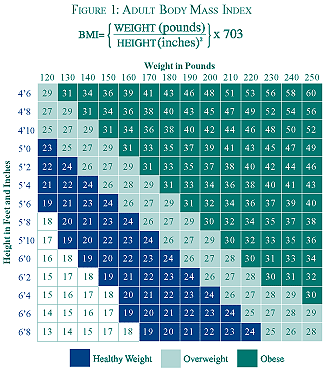
There are many ways to lose weight, but it is not always easy to keep the weight off. The key to successful weight loss is making changes in your eating and physical activity habits that you can keep up for the rest of your life. The information presented here may help put you on the road to healthy habits.
Health experts agree that you may gain health benefits from even a small weight loss if:
- You are obese based on your body mass index (BMI) (see BMI chart above).
- You are overweight based on your BMI and have weight-related health problems or a family history of such problems.
- You have a waist that measures more than 40 inches if you are a man or more than 35 inches if you are a woman.
A weight loss of 5 to 15 percent of body weight may improve your health and quality of life, and prevent these health problems. For a person who weighs 200 pounds, that means losing 10 to 30 pounds.
Your body weight is controlled by the number of calories you eat and the number of calories you use each day. To lose weight you need to take in fewer calories than you use. You can do this by creating and following a plan for healthy eating and a plan for regular physical activity.
You may also choose to follow a formal weight-loss program such as one offered by Montwood Medical Center that can help you make lifelong changes in your eating and physical activity habits.
Clinical Weight Loss Program
What it is: A clinical program provides services in a health care setting, such as a hospital. One or more licensed health professionals, such as medical doctors, nurses, registered dietitians, and/or psychologists, provide care. A clinical program may or may not be commercially owned.
Clinical programs may offer services such as nutrition education, physical activity, and behavior change therapy. Some programs offer prescription weight-loss drugs or gastrointestinal surgery.
Prescription Weight-loss Drugs
If your BMI is 30 or more, or your BMI is 27 or more and you have weight-related health problems, you may consider using prescription weight-loss drugs. Drugs should be used as part of an overall program that includes long-term changes in eating and physical activity habits. Only a licensed health care provider can prescribe these drugs. See "Additional Reading" for more information about prescription medications for the treatment of obesity.
Gastrointestinal Surgery
If your BMI is 40 or more, or your BMI is 35 or more and you have weight-related health problems such as diabetes or heart disease, you may consider gastrointestinal surgery (also called bariatric surgery). Most patients lose weight quickly, and many keep off most of their weight with a healthy eating plan and regular physical activity. Still, surgery can lead to problems that require more operations. Surgery may also reduce the amount of vitamins and minerals in your body and cause gallstones. See "Additional Reading" for more information about gastrointestinal surgery.

What a safe and effective program will offer:
- A team of licensed health professionals.
- A plan to help you keep weight off after you have lost it.
Program cautions:
- There may be side effects or health risks involved in the program that can be serious. Discuss these with your health care provider.
For more detailed information about choosing a safe and successful weight-loss program, please, feel free to contact the staff at Montwood Medical Center, at our normal office number.
It is not always easy to change your eating and physical activity habits.
You may have setbacks along the way.
But keep trying you can do it!
